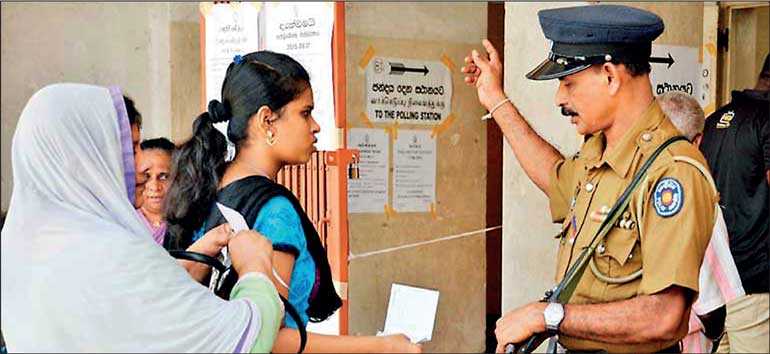Wednesday Feb 11, 2026
Wednesday Feb 11, 2026
Wednesday, 28 November 2018 00:00 - - {{hitsCtrl.values.hits}}

This article is written in the backdrop of a constitutional coup whose long-term impact on the democratic lives on everyday Sri Lankans could be longstanding. It is widely felt amongst civil society that given the media landscape the public might not fully grasp the gravity of the events that are taking place. It also follows the laughable attempts by people like Dayan Jayatilleka to swerve public opinion in line with their political interests. 
Though one must take note of the incredible bombardment of news favouring an SLPP angle, it may not be as effective on people who do a bit of searching on their own. YouTube videos of the previously mentioned spin doctor which are targeted at different segments of the society would show how both his viewpoint and rhetoric are incredibly racially divisive and in a psychopathic sense modulated to suit the audience.
As it is difficult to write anything on this topic that has not already been written or seems coloured by a political allegiance (I am a card-carrying member of the UNP) this article shall be based on a broad consensus/bipartisan view of the facts. The article will make positive statements (as opposed to normative) commenting on the upcoming events.
Most people believe there will be an election or at the very least a calling for an election in 2019. A budget must be passed for Government to function in 2019. External and rupees denominated Government debt payments in 2019 are higher than they are on average. The following is based on the assumption that Parliament will function into the next election.
Fiscal space is limited in 2019
This can be reframed to state that the incumbent Government in 2019 will not be able to deliver on the spending required to win an election. Though a budget may signal and be incorporative of tax cuts it is unlikely that given projected cash flows they will be fully enacted in time to have a positive impact on the election. It is likely that a political party with foresight in this regard will lean on a foreign lender to facilitate the spending.
The lending mentioned in the papers under the purported new Government is project financing. This means that funds will directly pass to the contractor and have no cash flow benefit to the Treasury. Lenders would also be weary of international odious debt legislation.
The new laws that were passed by the UNP Government will help facilitate more borrowing directly by the treasury and CBSL. This in contrast to when foreign borrowing is contingent and restricted to mega development projects. It will still be difficult to target foreign borrowing in a manner that turns an election in such a short period. Further spending given recent statements made by the treasury will be lower for the ending months of the year impacting growth in the start of the next year.
Given this it is likely that the Government will lean on the banking systems to extend credit to boost growth. Early signs of this are already present with the reduction of the statutory reserve ratio. The CBSL will also probably delay implementation of its interpretation of BASEL 3. Inflationary expectations will be heightened driving purchases of vehicles and property. Therefore, it is likely that the rupees will be under considerable pressure in the coming period.
Plans for the State banks to borrow internationally have also been fast-tracked to assist with increased lending. This in the long run will have a negative impact on the long-term profitability of the banks. This is as the borrowing will occur when the rupee is starting to depreciate. The recent credit downgrading will also impact the cost of funds. Bankers will also require considerable moral suasion to lend without collateral to bring credit to those economically vulnerable and thus likely to swing their vote on their own economic prospects.
The ideological leanings of the current CBSL Governor are at odds with that of Mahinda Rajapaksa. Many argue that Sri Lankans only conflate class with integrity. They also argue on how morally outstanding the current governor is. Arguments in this regard can be answered through his actions. In short it will be difficult to win the election by giving out election goodies. The opposition party will most likely promise a pay rise to civil servants that is more than that which the incumbent will be able to credibly promise.
The SLPP believes in low taxation
The signalled policy of the SLPP is highly regressive. It benefits the rich more than it does the poor. For instance, tax cuts on fixed deposits benefit people with more fixed deposits. VAT, a highly regressive and nominally high tax is one that a welfare-orientated State would look to reduce.
The SLPP’s economic policy is both difficult to place on a spectrum and highly inconsistent with any conventional ideological understanding of economics. Policies tend to have little cohesiveness. They however are highly beneficial to people and businesses aligned with the Rajapaksa family which sadly is the best way to define the economic policy. Implementation of IRD law will probably revert to a scenario reminiscent of the earlier Rajapaksa era if the SLPP is to be the incumbent.
Touted reform on the agricultural sector tends to take little concern of the way the sector is structured. Small scale farmers do not fall within the tax net. Agricultural intermediaries who inflate prices and take part in active profiteering on agricultural produce will benefit. Increased subsidy to fertiliser is a big pass through to a very monopolistic fertiliser industry who will increase their margins proportionately. People interested in exploring the topic should investigate how direct payments of fertiliser subsidy to the farmer were thwarted.
The SLPP strategy in this regard is weak as an informed agricultural producer would vote against it. This is further compounded by the demographic fact that less than a third of the workforce is employed in agriculture (declining figure). Targeting industry (textiles) and services (tourism) for preferential policy might have a larger impact on the total population.
The UNP on the other hand has increased taxation considerably. Both Excise and Customs revenue have grown exponentially in the time period. They have also limited profitability of the pharmaceutical sector. The Government took away vehicle permits. They have taxed big tobacco; increased taxation and signalled further actual collection on self-employed professionals; opened markets to foreign goods; increased investment substantially in transport infrastructure; implemented an incredibly unpopular short-term tax (Super Gains Tax); and delivered a competitive exchange rate. It is likely that they will increase direct taxes to be able to reduce VAT if they were the incumbent. They would also reduce prices through imports on sensitive election swinging goods.
As goal posts keep being moved with regards to recognising a government in Parliament, there can be no prediction on the immediate outcome. I however feel that being the opposition for either party is not really a death sentence in the current scenario contingent on being given access to free and fair elections. Year 2019 is not a popular year for any government
In such light it is hard to see true leftist parties in the UPFA aligning themselves with the SLPP. It is also likely that people ideologically inclined to the right wing are likely to join them. It is expected that there will be considerable crossovers in the coming period. Such defections are also coloured with an upcoming election. This will reduce the room for members elected by minorities to defect without affecting their upcoming electoral chances.
A genius plan
The predicted outcomes of this article are based on who the incumbent government will be when the election takes place. Most would agree that the events on 26 October were unusual. It has been branded as a desperate last-ditch effort to save the country and an unconstitutional coup. The SLPP/SLFP coalition seems affected by defections of SLFP members to the SLPP. It is also affected by presidential commissions on SriLankan Airlines which may have findings against the former strongman. Rajapaksa allies are yet to receive presidential pardons. This comes as the coalition against Mahinda is being accused of acting in consort. Both the JVP and TNA seem united in their political stance. Parliament has reconvened. This has all given time and space for a four-time prime minister with a weak electoral persona to negotiate. Negotiation is a skill which many would argue is core to his political survival. It is likely that a different persona will contest the coming election or appear significantly in campaigning. On a side note, the UPFA tactic of offering to release land held by the Army in return for political support to the TNA was not a good negotiation tactic. The Army should release land as it is the right thing to do.
Parliament can still pass the 20th Amendment giving room for both the SLPP and UNP to collude against the President. This would give all the power to the eventual prime minister. It must be someone quite confident in their genius or oblivious to the lack thereof who continues with the plan at 26 October. Such a person may however still win by breaking all the rules.
As goal posts keep being moved with regards to recognising a government in Parliament there can be no prediction on the immediate outcome. I however feel that being the opposition for either party is not really a death sentence in the current scenario contingent on being given access to free and fair elections. Year 2019 is not a popular year for any government.